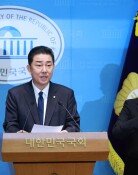Disappearance of Norths Propaganda Chief
Disappearance of Norths Propaganda Chief
Posted January. 27, 2007 07:24,
Recently, rumors have been spreading in North Korea that Jeong Ha Cheol (74-year-old), the propaganda secretary of the Workers Party, has defected from North Korea, stirring public sentiment.
Party officials have been going door-to-door to remove traces of Jeong from publications without giving any reason. Officials are painting over Jeongs face with black ink on any pictures that show Jeong accompanying North Korean leader Kim Jong Il or its former leader Kim Il Sung. They are also censuring his name with black ink if there are any passages that include his name and sealing the book. Moreover, writings by Jeong have been torn to pieces. All households which have a few dozens of those books now are required to get rid of them since most North Korea publications are propaganda books.
Jeong Ha Cheol, who studied philosophy at the Kim Il Sung University, was one of the most successful propaganda officials. He served as the editorial chief of the state-run newspaper Rodong Sinmun and the chairman of the Central Broadcasting Station before becoming the propaganda secretary of the Workers Party. It is a key post that oversees all the propaganda activities in North Korea, and Kim Jong Il also served in this post before being named as Kim Il Sungs successor in the mid 1970s.
Jeong, who was considered as one of the closest aides of Kim Il Sung, accompanied Kim every time he paid a state visit to China and even received the Kim Il Sung Decoration, the most highly recognized medal in North Korea at that time.
In fact, rumors about Jeong erupted in December 2005. Some media outlets reported that Jeong has stopped appearing in public since October 2005. There were no news reports on his exile.
Some sources said that he was imprisoned at a concentration camp in North Pyongan Province because his faults were revealed during an intensive investigation into the staff of Central Broadcasting who was caught drinking during the daytime.
According to the sources, Jeong was sentenced as a traitor against the party and revolution, and was ordered to be erased from all the records, including publications. In short, he is unlikely to regain his power since he has been completely shunned by North Korean society.
All these people were involved in the so-called, August Clan Incident. The names of the children of Kim Sung Ae, Kim Il Sungs third wife, who fell from political power and Seo Gwan-hee, former agricultural secretary of the Workers Party, who was shot to death on charges of espionage, were also removed from publications. You can see black marks quite often on North Korean political books. In North Korea, it is a principle that if one is accused of a serious crime, his or her family members and relatives (fathers side: up to second cousins, mothers side: up to first cousins) are also sent to concentration camps or deep in the mountains, as it happened in the feudal age.
The most common cause that North Korean committee officials consider as a serious crime is a drinking bout. Criticizing Kim Jong Il or the communist regime after having some drinks can not be tolerated in the North, and that is likely the case with Jeong. It is a felony to shake the regime. Recently, Joo Dong Il, a high ranking official in charge of electricity, was dismissed for suggesting to Kim Jong Il on a private occasion, How about we use the electricity used for unattended guest houses all across the country for the economic sector?
However, some analysts speculate possibilities of Jeongs involvement in serious corruption considering that North Korea lavishly spend money to purchase equipment from overseas for propaganda purposes every year.
Choi Yong Hae, the chairman of the League of Socialist Working Youth and who prepared the 13th World Festival of Youth and Students, was also found guilty of grave corruption. Although Choi was dismissed, his name was not censured with black ink. Chang Sung Taek, a senior official of the Workers Party, was also blamed of serious corruption, but he was recently pardoned. Corruption charges are far more lenient compared to criticizing the regime or Kim Jong Il.
Jeongs case is a good example that illustrates how insecure the power that top North Korean officials have once they lose the trust of Kim Jong Il. If North Korean officials are not cautious all the time, like walking on thin ice each day, they can be out of Kim Jong Ils favor.
zsh75@donga.com



![‘건강 지킴이’ 당근, 효능 높이는 섭취법[정세연의 음식처방]](https://dimg.donga.com/c/138/175/90/1/wps/NEWS/IMAGE/2026/01/18/133181291.1.jpg)



